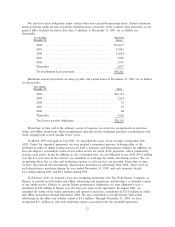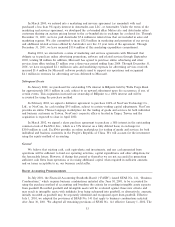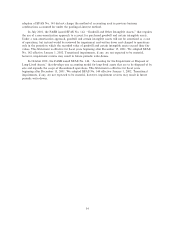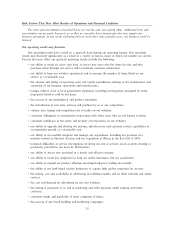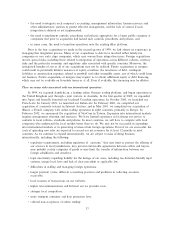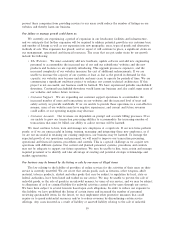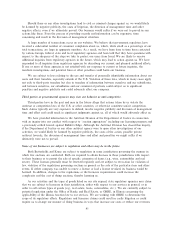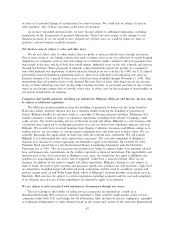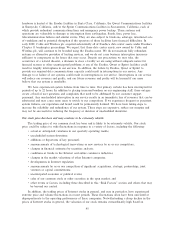eBay 2001 Annual Report Download - page 46
Download and view the complete annual report
Please find page 46 of the 2001 eBay annual report below. You can navigate through the pages in the report by either clicking on the pages listed below, or by using the keyword search tool below to find specific information within the annual report.or force us to prohibit listings of certain items for some locations. We could also be subject to Ñnes or
other penalties. Any of these outcomes could harm our business.
As we have expanded internationally, we have become subject to additional regulations, including
regulations on the transmission of personal information. These laws may require costly changes to our
business practices. If we are found to have violated any of these laws, we could be subject to Ñnes or
penalties, and our business could be harmed.
Our business may be subject to sales and other taxes.
We do not collect sales or other similar taxes on goods or services sold by users through our service.
One or more states or any foreign country may seek to impose sales or use tax collection or record keeping
obligations on companies such as ours that engage in or facilitate online commerce. Several proposals have
been made at the state and local level that would impose additional taxes on the sale of goods and services
through the Internet. These proposals, if adopted, could substantially impair the growth of e-commerce,
and could diminish our opportunity to derive Ñnancial beneÑt from our activities. In 1998, the U.S. federal
government enacted legislation prohibiting states or other local authorities from imposing new taxes on
Internet commerce for a period of three years, which has been extended through November 1, 2003. This
moratorium does not prohibit states or the Internal Revenue Service from collecting taxes on our income,
if any, or from collecting taxes that are due under existing tax rules. A successful assertion by one or more
states or any foreign country that we should collect sales or other taxes on the exchange of merchandise on
our system would harm our business.
Companies that handle payments, including our subsidiaries Billpoint, Half.com and Internet Auction, may
be subject to additional regulation.
The Half.com business model involves the handling of payments by buyers for the items listed by
Half.com's sellers. Internet Auction also has a business model involving the handling of payments by
buyers. Billpoint handles its customer funds as a provider of Internet payment solutions. Businesses that
handle consumers' funds are subject to numerous regulations, including those related to banking, credit
cards, escrow, fair credit reporting, privacy of Ñnancial records and others. Billpoint is a new business with
a relatively novel approach to facilitating payments. It is not yet known how regulatory agencies will treat
Billpoint. We recently have received inquiries from Oregon, California, Louisiana and Illinois asking us to
explain why we are not subject to various money transmitter laws and other laws in those states. We are
currently discussing the applicability of these laws with the relevant state authorities. We will register
Billpoint if it is determined that such registration is necessary. The cost and complexity of Billpoint's
business may increase if certain regulations are deemed to apply to its business. On October 26, 2001,
President Bush signed into law the International Money Laundering Abatement and Anti-Terrorist
Financing Act of 2001. This Act increases the penalties for failure to register under state payment related
laws and imposes new requirements on the entities regulated as Ñnancial institutions. The applicability and
interpretation of the Act's provisions to Billpoint is not clear, but should the Act apply to Billpoint, the
penalties for noncompliance are severe and, if triggered, would have a material adverse eÅect on our
business. In addition to the need to comply with these regulations, Billpoint's business is also subject to
risks of fraud, the need to grow systems and processes rapidly if its products are well received, a high level
of competition, including larger and better Ñnanced competitors and the need to coordinate systems and
policies among itself, us and Wells Fargo Bank, which is Billpoint's backend provider of payment services.
Similarly, Half.com may be subject to certain regulations regarding payments and the cost and complexity
of its business may increase if these regulations are deemed to apply to its business.
We are subject to risks associated with information disseminated through our service.
The law relating to the liability of online services companies for information carried on or
disseminated through their services is currently unsettled. Claims could be made against online services
companies under both U.S. and foreign law for defamation, libel, invasion of privacy, negligence, copyright
or trademark infringement, or other theories based on the nature and content of the materials disseminated
42


